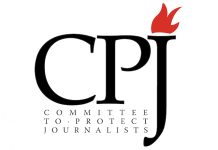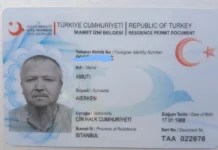Turkey is increasingly restricting the legal stay of Uyghurs and deporting some to third countries despite the risk of eventual return to China, in violation of the principle of non-refoulement, Human Rights Watch (HRW) said in a report released on Wednesday.
The report, “Protected No More: Uyghurs in Türkiye,” documents how Uyghurs no longer feel safe in the country due to the arbitrary cancellation of residence permits, the assignment of opaque “restriction codes,” pressure to sign so-called voluntary return forms while in detention centers and the issuance of deportation orders.
HRW said authorities are assigning “restriction codes” to Uyghurs’ records with little to no justification, leading to the rejection of residence applications, cancellation of valid permits and denial of citizenship. As a result many Uyghurs fall into irregular migrant status and live with constant fear of deportation.
“A simple complaint from a neighbor, being ensnared in a criminal case—even though later acquitted—can all result in decisions to apply the restriction codes,” the report states.
Another concern highlighted in the report is the pressure imposed on Uyghurs in detention centers to sign “voluntary return forms.” HRW warns that this exposes Uyghurs to removal to third countries with extradition agreements with China.
Courts have also dismissed Uyghurs’ appeals against deportation orders. In every case reviewed by HRW, the courts ruled that the non-refoulement principle did not apply, arguing that the applicants had failed to prove a risk of torture or ill-treatment if returned to China.
According to HRW, Ankara’s stance hardened as Turkey-China relations improved and Chinese trade and investment expanded. Since 2022 the government of President Recep Tayyip Erdoğan has toned down public criticism of Beijing’s treatment of Uyghurs in Xinjiang and stepped up measures targeting Uyghur refugees and migrants in Turkey.
China’s treatment of the Uyghurs and other Muslim minorities has drawn international condemnation, with human rights groups estimating that some 1 million Uyghurs have been arbitrarily incarcerated in a network of prison camps in Xinjiang. There have also been reports of forced sterilization, systematic torture and rape.
Beijing denies all allegations of abuse of Uyghurs and describes the camps as vocational training facilities to combat religious extremism.
HRW said it sought comment from Turkey’s Presidency of Migration Management but received no response.
It called on the Turkish government to uphold the principle of non-refoulement and immediately stop all deportations of Uyghurs to third countries. It also urged other governments to suspend transfers of Uyghurs to Turkey, arguing it can no longer be considered a safe third country for them, and to consider resettlement options for Uyghur refugees currently in Turkey.
In addition to sharing a religion with the majority of Turkey’s population, Uyghurs — a Turkic ethnic group — also speak a similar language. An estimated 50,000 Uyghurs are currently living in Turkey, making it the largest Uyghur diaspora in the world. But a Turkey-China extradition treaty signed in 2017 that is still awaiting ratification by the Turkish Parliament has led to fears that it could be used to target Uyghurs in Turkey.















